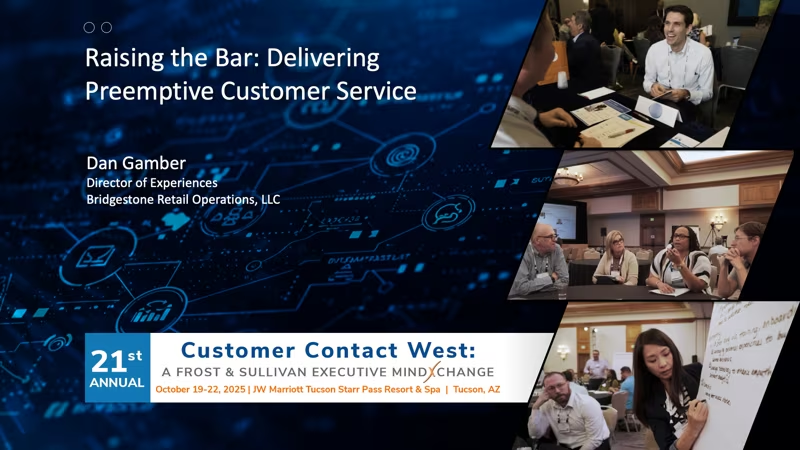Introduction
Recently, Customer Engagement Leadership Council members and select Customer Contact West: A Frost & Sullivan MindXchange event attendees had the opportunity to tour Intuit’s innovative Customer Contact Center in Tucson, Arizona. Intuit is a business and financial software company that develops and sells financial, accounting and tax preparation software and related services for small businesses, accountants and individuals.
Intuit has numerous teams generating customer insights that are fed back into their core product teams to eliminate customer pain in their offerings. The organization also has top-notch teams that do frontline care and sales. This interactive site tour showcased Intuit’s people, call center philosophy and dynamic capabilities.
As the physical tour concluded, a group of customer contact industry leaders gathered with hosts Don Yager, Director, Learning, Development, & Quality/Tucson Site Business Leader and Jeffrey Laird, Director, Awesome Help and Service, to explore Intuit’s organizational culture, location, products and more. Here are highlights and key take-aways from their informed discussion:
Intuit Customers Prefer Video
The first insight shared by Don Yager was on the use of video in the contact center. Intuit had learned that their customers preferred video over other communication channels by more than 20%.
The hosts observed that this was true across all generational lines (not just the millennials, for example) and although they had not yet determined a specific reason why this was true, they planned to continue testing, as is their modus operandi. Intuit stressed the importance of ongoing testing for these kinds of issues and channel questions. Perhaps the fact that Intuit customers of all ages preferred video augurs an age of the technology leading the generations, not the generations leading the technology choices.
Next, the hosts discussed bringing customers into a lab setting to help design Intuit’s mobile User Interface, or UI. They explained how Intuit tested for colors, back-drops and other key components of the customer experience, leading to many “aha” moments, such as the strong customer preference for video.
Another site tour participant asked whether different agent characteristics were required to work with video. The Intuit executive expressed that the most important characteristic was a professional attitude, and that once they got over the initial newness, most agents liked working with video. He did add however, that their agents were not strictly required to be on video, and that if a CS representative was particularly uncomfortable with video, they would find other ways for them to contribute.
The Brand Is King
The discussion moved to the importance of brand management and building the brand, especially as it relates to customer-facing contact center employees. Specifically, one of the touring executives asked how the contact center represented Intuit’s core values. The Intuit executives present expressed that their organization offered intrinsic benefits such as giving every employee 32 hours a year to pursue a passion, and that egalitarian brand values were modeled from the top down, with minimal levels and an overall Intuit style of transparency across the organization that included the contact center.
Further, Don Yager explained that Intuit contact center employees were valued as not only a key part of the organization and it’s branding, but were considered perhaps the most important part of the organization due to their product knowledge and constant interaction with customers. This was clearly summed up when one of the Intuit tour guides stated that the “front line are the experts” and underscored that they know more than any project manager or engineer. Finally, he noted that the customer care team is regarded as the real talent.
When one of the customer contact executives inquired about the role of demographics in the Intuit contact center, Intuit indicated that they did not currently approach customer care based on demographics, though that is something they plan to observe and test going forward.
Leveraging “Styles of Influence” for Better Teamwork
The conversation then moved to “Styles of Influence” (SOI) a key training and assessment tool used at Intuit. This measurement tool helps individuals and their co-workers understand key behaviors. Once certain behavioral drivers are determined, this information can be utilized to help others to understand and work with a given style. Style is assessed across cognitive, relational, goal and detail scales. At Intuit, everyone’s SOI is listed in an online directory and SOI’s are used to help identify individual and team strengths and opportunities too.
Circling back to the brand discussion, one of the final questions asked pertained to how the brand was reflected in Intuit’s external communications. Tour guides Don Yager and Jeffrey Laird both referenced that Intuit’s branding is carried throughout software experience design and partner sites as well.
Finally, it was noted that Intuit’s senior management recently gave the green light for internal funding to improve Intuit’s infrastructure, including their call center, the heart of customer engagement for this organization and for so many others.



